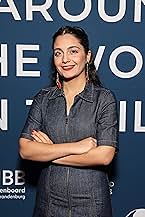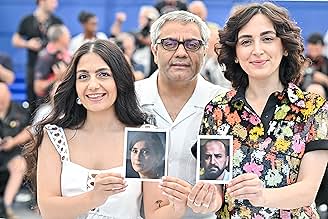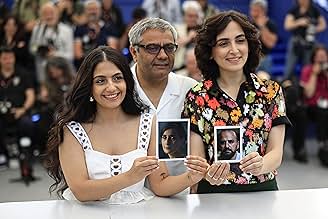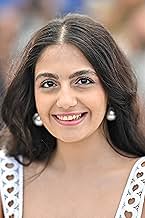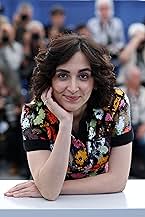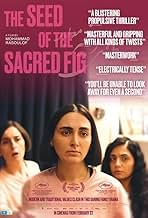Ajouter une intrigue dans votre langueAn investigating judge struggles with paranoia amid political unrest in Tehran caused by the death of a young woman. When his gun goes missing, he suspects his wife and daughters, imposing h... Tout lireAn investigating judge struggles with paranoia amid political unrest in Tehran caused by the death of a young woman. When his gun goes missing, he suspects his wife and daughters, imposing harsh measures that fray family ties.An investigating judge struggles with paranoia amid political unrest in Tehran caused by the death of a young woman. When his gun goes missing, he suspects his wife and daughters, imposing harsh measures that fray family ties.
- Nommé pour 1 oscar
- 36 victoires et 71 nominations au total
Avis en vedette
SotSF is pretty great until near the end when the tension started to dissipate (or maybe it is because if you show a gun for that long, the anti-climax of it *not* going off should be earned and I am not convinced this did). Maybe it was seeing so many putting this in the top, top pantheon of the year's films; not only it's Oscar nomination, but the nature of how it was basically smuggled out of the country to be Screened at Cannes (itself a bold and inspiring story to get to where it found distribution for much of the world) brings an expectation, not to mention the run time. The fact that it is really really profound and strong in the ways that matter counts though, especially as a film about family dysfunction and how the roles they've been put into are disastrous.
I loved how the mother was not that sympathetic to the daughters early on, and yet there were more than a few wrinkles in what the filmmaker shows us of the distance between husnand and wife - all those nights where he comes home and she at first stays up but then falls asleep as he is out longer and longer (and to look back after the film is done at those scenes and to understand *why* he was out so long having "meetings" at work adds to the chilling nature of his response) - and that if it wasn't for this missing gun something else was going to break in this family some way. And this is a time period that is not some far off context but a society that is actively in religious oppression and armed to the teeth.
Some of the film is shot fairly standard, coverage being largely shot reverse shot and so forth for dialog, but what's impressive to me is when Rasoulof breaks from this, like when the girl's friend is at the house with the battered face and the mother takes time to pick out the pieces of weaponry from her wounds. That is the most upsetting part of the whole film if I take stock of it all, in how carefully she takes in picking out those pieces, and it's also from here that the mother Najmeh may not say it outright (and she still has a lot of motherly consternation for her daughters after this, especially in the "it'll upset your father" realm, Golestani is in like 6 dimensions with her performance), but she is changed and has to see things differently now. Or will she, is a key question.
It does lean more into a Genre/Thriller kind of story in the last half hour - almost like something out of the Shining if one were to say more like a Horror film (only our dad/husband just has his own maniacal paternal paranoia and self hatred to blame) - and that isn't quite as absorbing as just seeing this family at home. But we do need that moment where the two people following the family on the road confront the dad, for us to see just what extent they are at now in the story, and that it almost has to unravel from there with what the gun is really all about. And all of this with the immediate and harrowing backdrop of the protests and demonstrations of the period, it makes for an extremely satisfying film.
I loved how the mother was not that sympathetic to the daughters early on, and yet there were more than a few wrinkles in what the filmmaker shows us of the distance between husnand and wife - all those nights where he comes home and she at first stays up but then falls asleep as he is out longer and longer (and to look back after the film is done at those scenes and to understand *why* he was out so long having "meetings" at work adds to the chilling nature of his response) - and that if it wasn't for this missing gun something else was going to break in this family some way. And this is a time period that is not some far off context but a society that is actively in religious oppression and armed to the teeth.
Some of the film is shot fairly standard, coverage being largely shot reverse shot and so forth for dialog, but what's impressive to me is when Rasoulof breaks from this, like when the girl's friend is at the house with the battered face and the mother takes time to pick out the pieces of weaponry from her wounds. That is the most upsetting part of the whole film if I take stock of it all, in how carefully she takes in picking out those pieces, and it's also from here that the mother Najmeh may not say it outright (and she still has a lot of motherly consternation for her daughters after this, especially in the "it'll upset your father" realm, Golestani is in like 6 dimensions with her performance), but she is changed and has to see things differently now. Or will she, is a key question.
It does lean more into a Genre/Thriller kind of story in the last half hour - almost like something out of the Shining if one were to say more like a Horror film (only our dad/husband just has his own maniacal paternal paranoia and self hatred to blame) - and that isn't quite as absorbing as just seeing this family at home. But we do need that moment where the two people following the family on the road confront the dad, for us to see just what extent they are at now in the story, and that it almost has to unravel from there with what the gun is really all about. And all of this with the immediate and harrowing backdrop of the protests and demonstrations of the period, it makes for an extremely satisfying film.
Tonight, I watched the film "The Fig Tree of Temples" and I have to say, it was one of the most beautiful and impactful cinematic experiences I've ever had. What made this film resonate with me so deeply wasn't just its strong and artistic storytelling, but the fact that every scene felt so realistic and connected to my personal experiences. It was as if every moment of the film reminded me of the tough and tense period we all went through.
The film beautifully and profoundly touches on the Mahsa Amini revolution and the social and political crises of that time, a period in which I personally participated and witnessed days filled with hardship and uncertainty. The story of the two girls in this context felt like a symbol for millions of Iranians who lived through those moments. I saw myself in those two characters, and this deep empathy gave me an opportunity to understand the emotions and struggles of that era.
The film was emotionally overwhelming, and each scene reminded me of how we all lived through those days, filled with both pain and hope. For me, this film is not just a remarkable piece of art, but also a reminder of a painful and crucial chapter in modern Iranian history.
If you're looking for a film that, in its beauty, also brings to light the harsh and painful truths of our society, "The Fig Tree of Temples" is an exceptional choice.
The film beautifully and profoundly touches on the Mahsa Amini revolution and the social and political crises of that time, a period in which I personally participated and witnessed days filled with hardship and uncertainty. The story of the two girls in this context felt like a symbol for millions of Iranians who lived through those moments. I saw myself in those two characters, and this deep empathy gave me an opportunity to understand the emotions and struggles of that era.
The film was emotionally overwhelming, and each scene reminded me of how we all lived through those days, filled with both pain and hope. For me, this film is not just a remarkable piece of art, but also a reminder of a painful and crucial chapter in modern Iranian history.
If you're looking for a film that, in its beauty, also brings to light the harsh and painful truths of our society, "The Fig Tree of Temples" is an exceptional choice.
Where do I even begin ?.. Words like freedom and dignity are not just mere words but they carry in them the deepest pain and suffering of all of humanity, Pain and suffering that were unawaredly endured for thousands of years through social and all kinds of oppression at the hands of a few oppressors and many a times by the very social norms that the humanity had laid out for itself through the truncated understanding of its own social condition in the larger scheme of collective human existence, how do you even go about freeing yourself from the clutches laid out by the collective oppression that has become your identity and the very means to your existence, how do you even go about waking up the society to the cultural cruelty that it's inflicting on its own cultural freedom and social well-being, The seed of the scared fig is not just a movie about Iran and it's women and their struggle over theocratical oppression to expand the social space for their personal freedom to reach the realms of human dignity and it's social acknowledgement, it's a much deeper study on the conflict that arises between the all empowered state through whatever social dictum and the individual freedom which forms the basis of the creation of the sub-unit called family, the very basis on which societies as such come into existence and seek to thrive in various forms and colours...This movie carries a seed in it that humanity needs to cherish for its own better future ...
The sacred fig is also the strangler fig. It nuzzles its host even as it strangles them to death. The criminal is not the one you expect.
Iman is climbing the ladder in Iran's judicial system. High minded, ambitious, and hard-working, he strives to earn the approval of his superiors and is promoted. Expecting adulation, Iman encounters rebellion instead. Where he presumes love in his workplace, country, wife and daughters, he finds insurgence. If Iman looks inside himself, he might find a way to set things right.
The Seed of the Sacred Fig won two prizes at the Cannes film festival and succeeds because of its authenticity, depth, capable actors, and riveting story. Director Mohammad Rasoulof spent time in prison for the crime of practicing his art of filmmaking. Rasoulof appeared via video at this Toronto International Film Festival screening to tell the story of one of his interrogators who felt shame at his actions and didn't know in what direction to turn. He claimed to be getting grief from his family. This interrogator is the model for the character of Iman.
This raw and unsettling film features actual footage from the violent 2022 uprising in Iran over the death of 22-year-old Mahsa Amini, who was taken into custody for allegedly wearing her hijab improperly. The film reminds us to take a close look at our workplace, country, friends, family, and selves in order not to become a host for any strangler figs, no matter how sacred they claim to be.
Iman is climbing the ladder in Iran's judicial system. High minded, ambitious, and hard-working, he strives to earn the approval of his superiors and is promoted. Expecting adulation, Iman encounters rebellion instead. Where he presumes love in his workplace, country, wife and daughters, he finds insurgence. If Iman looks inside himself, he might find a way to set things right.
The Seed of the Sacred Fig won two prizes at the Cannes film festival and succeeds because of its authenticity, depth, capable actors, and riveting story. Director Mohammad Rasoulof spent time in prison for the crime of practicing his art of filmmaking. Rasoulof appeared via video at this Toronto International Film Festival screening to tell the story of one of his interrogators who felt shame at his actions and didn't know in what direction to turn. He claimed to be getting grief from his family. This interrogator is the model for the character of Iman.
This raw and unsettling film features actual footage from the violent 2022 uprising in Iran over the death of 22-year-old Mahsa Amini, who was taken into custody for allegedly wearing her hijab improperly. The film reminds us to take a close look at our workplace, country, friends, family, and selves in order not to become a host for any strangler figs, no matter how sacred they claim to be.
A provocative & politically charged drama that also serves as a scathing critique of oppressive rule through the devastating account of a family's unraveling, The Seed of the Sacred Fig is an increasingly incendiary story that takes its time to acquaint us with the family dynamics before seeds of paranoia & mistrust take root in the household and turn the whole thing into a familial nightmare.
Written, co-produced & directed by Mohammad Rasoulof, the main incident that sets the plot into motion takes place over an hour into the picture but in that time, it does familiarise us with the volatile situation & civil unrest taking place outside the house that complicates things a lot more within the household. Rasoulof is patient in his approach and provides ample space for the characters to breathe.
The first half covers the clash in ideology & perspective that unfolds between the ladies of the house over the real-world riots & protests taking place outside their apartment, the footage of which is interspersed within the narrative. The film is expertly shot but the narration is rather clunky and only held together by strong performances from the cast. The runtime is also often felt, and the final act overstays its welcome.
Overall, The Seed of the Sacred Fig is a bold, brave & audacious effort from Rasoulof who risks his own life & puts everything on the line to deliver a scorching indictment that's timely & urgent in more ways than one. The slow-burn pace makes the length all the more daunting despite the premise being interesting on paper and the film as a whole needed to be more tightly-knitted to make its powerful message heard with thunderous clarity.
Written, co-produced & directed by Mohammad Rasoulof, the main incident that sets the plot into motion takes place over an hour into the picture but in that time, it does familiarise us with the volatile situation & civil unrest taking place outside the house that complicates things a lot more within the household. Rasoulof is patient in his approach and provides ample space for the characters to breathe.
The first half covers the clash in ideology & perspective that unfolds between the ladies of the house over the real-world riots & protests taking place outside their apartment, the footage of which is interspersed within the narrative. The film is expertly shot but the narration is rather clunky and only held together by strong performances from the cast. The runtime is also often felt, and the final act overstays its welcome.
Overall, The Seed of the Sacred Fig is a bold, brave & audacious effort from Rasoulof who risks his own life & puts everything on the line to deliver a scorching indictment that's timely & urgent in more ways than one. The slow-burn pace makes the length all the more daunting despite the premise being interesting on paper and the film as a whole needed to be more tightly-knitted to make its powerful message heard with thunderous clarity.
Le saviez-vous
- AnecdotesDirector Mohammad Rasoulof was originally scheduled to take part in the 2023 Cannes Film Festival as a jury member of the Un Certain Regard section. However, he was arrested in July 2022 after criticising the government's crackdown on protestors in the southwestern city of Abadan in Iran over deadly building collapse. On May 8, 2024, Rasouloff's lawyer announced that he has been sentenced to eight years in prison as well as flogging, a fine and confiscation of his property. On May 12, 2024, Rasouloff announced that he managed to flee Iran and was staying at an undisclosed location in Europe. On May 24, 2024, Rasouloff attended the film's premiere in Cannes and on the red carpet he held up photos of two of the film's actors, Soheila Golestani and Missagh Zareh.
- Générique farfeluOpening credits: "Ficus Religiosa is a tree with an unusual life cycle. It seeds, contained in bird droppings, fall on other trees. Aerial roots spring up and grow down to the floor. Then, the branches wrap around the host tree and strangle it. Finally, the sacred fig stands on its own."
- ConnexionsFeatured in 82nd Golden Globe Awards (2025)
Meilleurs choix
Connectez-vous pour évaluer et surveiller les recommandations personnalisées
Détails
Box-office
- Brut – États-Unis et Canada
- 860 139 $ US
- Fin de semaine d'ouverture – États-Unis et Canada
- 35 230 $ US
- 1 déc. 2024
- Brut – à l'échelle mondiale
- 6 589 827 $ US
- Durée
- 2h 47m(167 min)
- Couleur
- Mixage
- Rapport de forme
- 2.35 : 1
Contribuer à cette page
Suggérer une modification ou ajouter du contenu manquant



